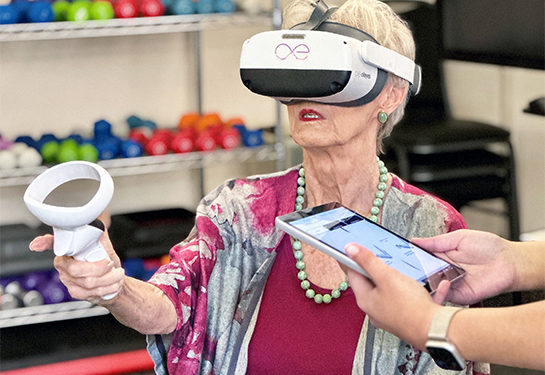Peripheral Nerve Surgery
Our neurosurgeons provide the latest treatments for peripheral nerve conditions. We’re here to offer compassionate care and pain relief.
Medically reviewed by Stephano Chang, M.D. on July 10, 2025.

About Peripheral Nerve Surgery
Peripheral nerve disorders affect the nerves outside your brain and spinal cord, causing movement problems, numbness, pain, or weakness. We understand that living with a peripheral nerve condition can affect all areas of your life and interfere with activities you enjoy. Our expert team uses the latest surgical techniques to bring you relief.
In our lab, researchers aim to restore function and alleviate pain after neural injury through innovative approaches in neuromodulation and neural regeneration. We seek to develop precision therapies and improve outcomes in patients with nerve injuries and refractory pain syndromes.
Peripheral Nerve Surgeries
Surgery is one of the most effective ways to relieve peripheral nerve pain. We start with a comprehensive evaluation to understand your condition and symptoms, and then your neurosurgeon will explain your options. Surgical approaches to help you live pain-free include:
Nerve Release (Nerve Decompression)
This surgery relieves pressure by freeing a pinched or trapped nerve, helping reduce pain and improve ease of movement.
Peripheral Nerve Stimulation
Peripheral nerve stimulation uses a small, implanted device placed under the skin near the targeted nerve to control pain.
Rhizotomy
In this procedure, your surgeon disrupts specific nerve fibers to help relieve chronic pain or muscle spasms.
Request an Appointment
As Sacramento's No. 1 hospital, you'll benefit from unique advantages in primary care and specialty care. This includes prevention, diagnosis and treatment options from experts in 150 specialties.
Referring Physicians
To refer a patient, submit an electronic referral form or call.
800-4-UCDAVIS
Patients
Call to make an appointment.
Consumer Resource Center
800-2-UCDAVIS
You may need tests to help us plan the procedure. Your team will explain the procedure, how to prepare, and what to expect as you recover. We’re always available to answer your questions and provide support.
-

Peripheral Nerve Surgery
Depending on the procedure, you may have local, regional or general anesthesia. We use minimally invasive techniques, reducing scarring and recovery time. We’ll monitor you throughout the surgery, and you will not feel pain during the procedure.
-

Neurostimulation Device Placement
For this outpatient procedure, you’ll receive local anesthesia to numb the surgery area. We use minimally invasive techniques to place a small electrical device that reduces nerve pain.
-

After Surgery
Recovery and nerve pain relief may take several weeks or months. Physical therapy will help you regain function and strength. If you receive a neurostimulation device, you can go home the same day of your procedure.
Home Care After Peripheral Nerve Surgery
Your healing and recovery time depend on the type of surgery you had. Your care team will give you detailed instructions to follow at home. We’ll let you know when it’s safe to resume your regular activities. We’re here to support you as you recover.
Incision Care
Keep your incision clean and dry and change the bandages according to your care team's instructions. If possible, elevate the surgery areas to reduce swelling.
Pain Management
Your team will give you a pain management plan. You may have prescription pain medication or over-the-counter pain relievers.
Follow-Up Appointments
During follow-up appointments, we’ll check your healing, recovery, and progress. We’ll monitor your improvements in pain, mobility, and function.
When to Contact Your Neurosurgeon
Call us if you experience a fever, severe pain, redness or swelling around your incision, or new numbness or weakness. We're here to help if you have any concerning symptoms.

Ranked among the nation’s best hospitals
A U.S. News & World Report best hospital in cardiology, heart & vascular surgery, diabetes & endocrinology, ENT, geriatrics, neurology & neurosurgery, and pulmonology & lung surgery.

Ranked among the nation’s best children’s hospitals
U.S. News & World Report ranked UC Davis Children’s Hospital among the best in pediatric nephrology, orthopedics*, and pulmonology & lung surgery. (*Together with Shriners Children’s Northern California)

Ranked Sacramento’s #1 hospital
Ranked Sacramento’s #1 hospital by U.S. News, and high-performing in aortic valve surgery, back surgery (spinal fusion), COPD, colon cancer surgery, diabetes, gynecological cancer surgery, heart arrhythmia, heart failure, kidney failure, leukemia, lymphoma & myeloma, lung cancer surgery, pacemaker implantation, pneumonia, prostate cancer surgery, stroke, TAVR, cancer, orthopedics, gastroenterology & GI surgery, and urology.

The nation’s highest nursing honor
UC Davis Medical Center has received Magnet® recognition, the nation’s highest honor for nursing excellence.

World-class cancer care
One of ~59 U.S. cancer centers designated “comprehensive” by the National Cancer Institute.

A leader in health care equality
For the 13th consecutive year, UC Davis Medical Center has been recognized as an LGBTQ+ Healthcare Equality Leader by the educational arm of America’s largest civil rights organization.

